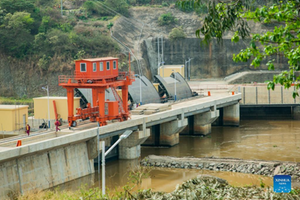How FAO is impacting TZ agriculture

FAO Representative to Tanzania Fred Kafeero (middle) addresses journalists in Arusha in a past event. PHOTO | FILE
Mwananchi Thought Leadership Forum (MTLF) reporter ROSEMARY MIRONDO had an interview with the Representative in Tanzania of the Food and Agriculture Organisation (FAO), MR FRED KAFEERO, who – among other things – expounded upon why agriculture is a lifeline for many. Read on…
What is the role of FAO in Tanzania?
FAO is a specialised technical Agency of the United Nations with a mandate to manage all aspects of food and agriculture – including crops, livestock, fisheries and natural resources.
We provide technical assistance to the government of Tanzania in efforts to eliminate hunger, food insecurity and malnutrition; thus contributing to improving the living standards of all, especially the rural poor.
What have you been doing for all these years?
For 42 years since establishing a Country Office here, FAO has worked closely with the government in the development and implementation of coherent policies, legislation and programmes focusing on food security, nutrition and reduction of rural poverty through crops production, livestock, fisheries and sustainable management of natural resources. A large number of sub-sectoral laws, policies and strategic frameworks have benefited from FAO’s technical support and expertise.
We have over the years strengthened government capacity to align with international standards, codes of conduct and legal frameworks in food and agriculture, and its reporting commitments to international processes through a strong and vibrant agricultural statistics system.
We have introduced proven approaches and good agricultural practices directly working with technical officers, farmers and civil society organizations.
FAO has also strengthened skills, knowledge and innovativeness of government personnel through training, exposure and secondments to various FAO events and projects.
We work closely with academic, training and research institutions in Tanzania, and are strong advocates of increased funding to enable them make meaningful impact
We have played a key technical role in designing various agricultural investment programmes for financing by our partners, including EU, World Bank, IFAD and the African Development Bank.
How does your partnership with Tanzania work?
FAO operations in Tanzania are guided by a Country Programming Framework (CPF) which sets out priority areas for our support and partnership with the government. It is an integral part of the UN Development Assistance Plan (UNDAP-II), and is aligned to the priorities of the government and FAO’s global strategic objectives.
The current CPF runs through 2017 to 2020, and sets out priority areas to guide FAO support and partnership with the government of Tanzania – thus combining innovative international best practices and global standards with national and regional expertise.
The areas are: supporting the development and implementation of evidence-based agriculture policies; legal frameworks and investment programmes; increasing agricultural productivity and production for food and nutrition security; improving market access for increased incomes; strengthening resilience to climate -related threats, and sustainable management of natural resources.
This means we work in several partnerships with relevant government institutions, as well as Researchers and Academia; UN entities; development partners; CSOs and the private sector.
What is the place of agriculture in Tanzania?
FAO looks at the sector in its broad sense including livestock, fisheries and forests. There’s no doubt that agriculture is key to economic growth, effective poverty reduction, elimination of hunger and malnutrition in Tanzania – and is the largest employer, particularly of the rural poor. Agricultural investments throughout the value-chain in the country are, however, still quite low vis-à-vis its enormous potential.
Tanzania is part and parcel of the broader global community and is, therefore, obliged to meet the UN Sustainable Development Goals (2030), (the African Union) Agenda-2063: The Africa We want; Africa’s Commitment to End Hunger by 2025; and the 2014 Malabo (Equatorial Guinea) Declaration on Accelerated Agricultural Growth and Transformation for Shared Prosperity and Improved Livelihoods.
All these frameworks mean that Tanzania has to prioritize and transform its agriculture; to heighten political commitment; increase public investment levels; double productivity and significantly reduce malnutrition.
The government has expressed its aspirations and commitments through two key multi-sectoral investment programmes, namely: the Agricultural Sector Development Programme-II and the National Multi-sectoral Nutrition Action Plan. But a close monitoring of progress is essential.
What does the future hold for Tanzania’s agriculture?
It is good to see that the government, development partners, the private sector and other stakeholders jointly developed and adopted long-term multi-sectoral and multi-stakeholder frameworks to guide investments in agriculture, food security and nutrition. Effective coordination and integrated implementation are key. FAO advocates a prominent role of domestic and international private sector in making responsible agricultural investments; getting modern production and processing technologies into the country; increasing sectoral financing, and empowering smallholders in accessing profitable markets.
There have been various forums urging the government to facilitate an enabling environment for investments in agriculture; and to foster dialogue and timeliness in decision-making over agricultural investment programmes.
Regarding public financing, the Agriculture budget is still inadequate to make significant impact – and, even then, the proportions disbursed are often below target.
In this era of unpredictable rains and flash floods, prolonged dry seasons, emergence of new pests and diseases, fluctuating prices for agricultural produce, and the threat of deforestation, we need the commitment of every stakeholder to work collaboratively if we are to amplify the sector’s contribution to sustainable economic growth.
Crucial to realizing impact of the sector are the government’s role as an enabler and coordinator of ASDP-II implementation; centrality of farmers; as well as the support of development partners, NGOs, private sector, researchers and academia.
How will you support this future direction?
Agriculture is our lifeline, and we should all join hands to ensure that the sector thrives and meets the food and nutrition needs of the growing population. As such, FAO will continue working with other development partners, UN entities and key stakeholders in supporting the government’s priorities in Agriculture. We will provide our technical assistance in development and implementation of policies, legal frameworks and investment programmes.
We will continue to disseminate proven good agriculture practices for a more productive and nutrition-sensitive agriculture that strengthens farmers’ resilience to climate change. We will continue to play our role in strengthening the capacities of government institutions to put in place systems, and improving processes along entire value-chains that meet international standards for products, food safety and hygiene.
About the MWANANCHI Thought Leadership Forum…?
This is a great initiative that gives an opportunity for experts and ordinary citizens to deliberate on important issues which impact livelihoods and the economy in general. FAO congratulates the MWANANCHI Thought Leadership Forum in leading by example to show the positive role of media in fostering development.
‘Agriculture Our Lifeline’ is a befitting topic for all stakeholders because, with agriculture, you achieve economic development, food security and nutrition. Agriculture engages a majority of the people in this country, and puts money in the pockets of many people.




